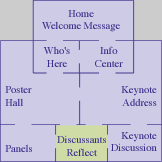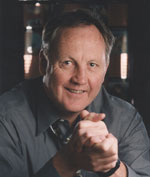
|
| Michael Fullan's Poster Hall Reflections |
|
 Michael Fullan Michael Fullan |
I read 20 Poster Hall entries and offer the following reflections:
- What struck me (and consistent with our own research) is that it is not good enough to have: vision and strong curriculum and instructional resources and built-in professional development and partnerships and collaboration. It must seem strange to say that even if you have all those it wonít be a success.
- What is needed in addition is "A very strong underlying conception of the change process" (eg. being an expert in new science curriculum is not the same as being an expert in the process of change).
|
- Some of the change expertise issues include:
- Donít think that Systemic Science is Systemic Change. For Systemic change you have to address the "when multiple innovations collide" problem. How to link or take into account multiple initiatives is the key question.
- Work on alignment, connectedness, coherence-making with existing and changing state-assessment systems. It is not enough to be right, you have to take into account the official assessment system maximizing linkages. Also, develop Assessment Literacy which is the capacity to use student achievement as a point of departure for school improvement plans.
- You have to learn how to deal with resistance more effectively. Teachers who are resistant often have a few good points; and they are essential concerning the politics of implementation (see my Leading in a Culture of Change, Jossey-Bass, 2001).
- Make sure you focus on the lead role of the principal (see the May, 2002 issue of Educational Leadership re. my article on this).
- Work on improving the infrastructure (district role, other agencies) Ė I realize the initiative does this, but I am reinforcing it here.
- Appreciate the time line (you should be able to accomplish a lot in 3 years Ė not sustainability) (See point 4).
- Work on the conditions for sustainability. This is new work. Our conceptualization so far includes: improving the moral/social environment; learning in context; leadership at may levels; improve the working conditions of the teaching profession (see the May Educational Leadership article).
Thatís all for now.
Michael Fullan
 |
|
| |


